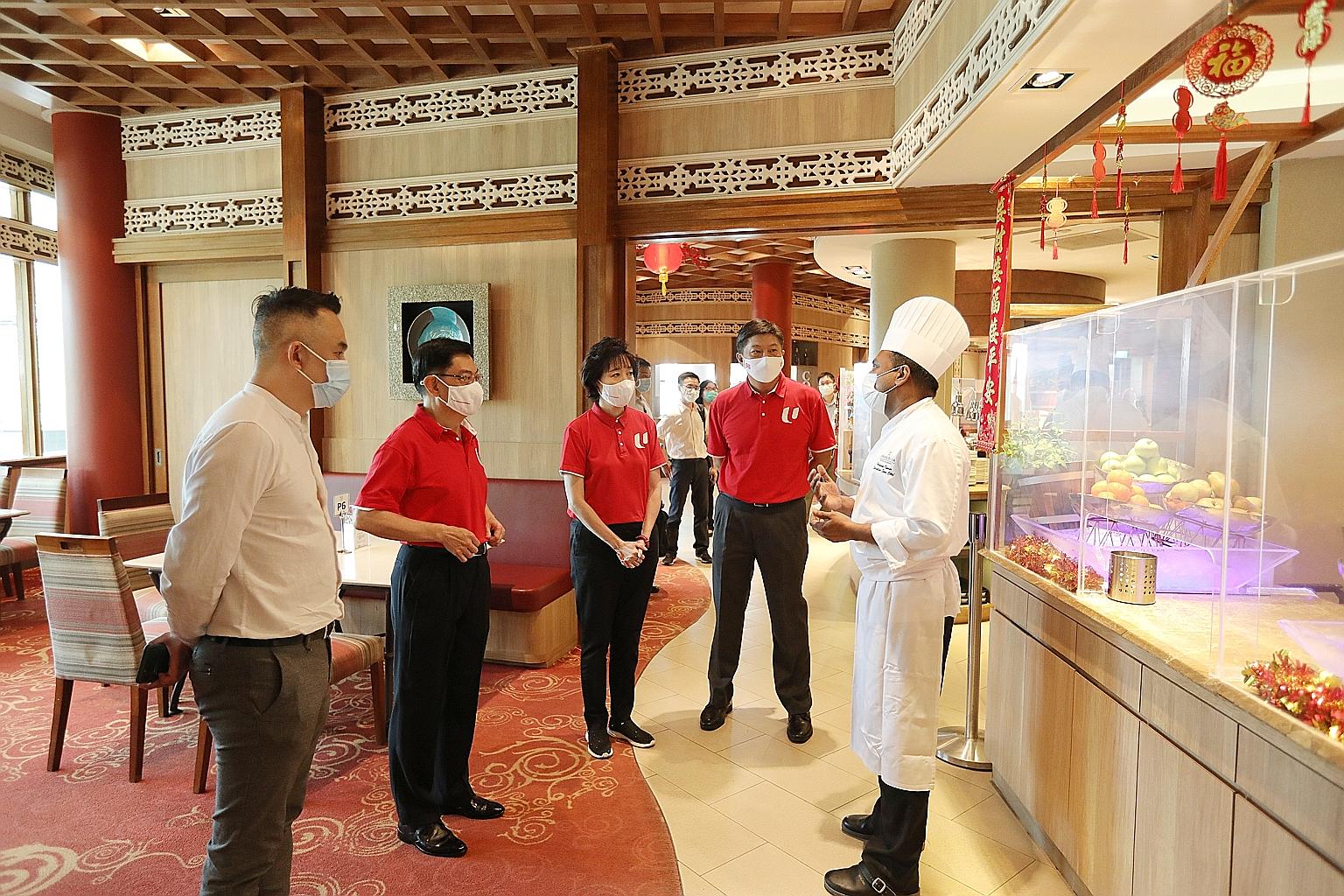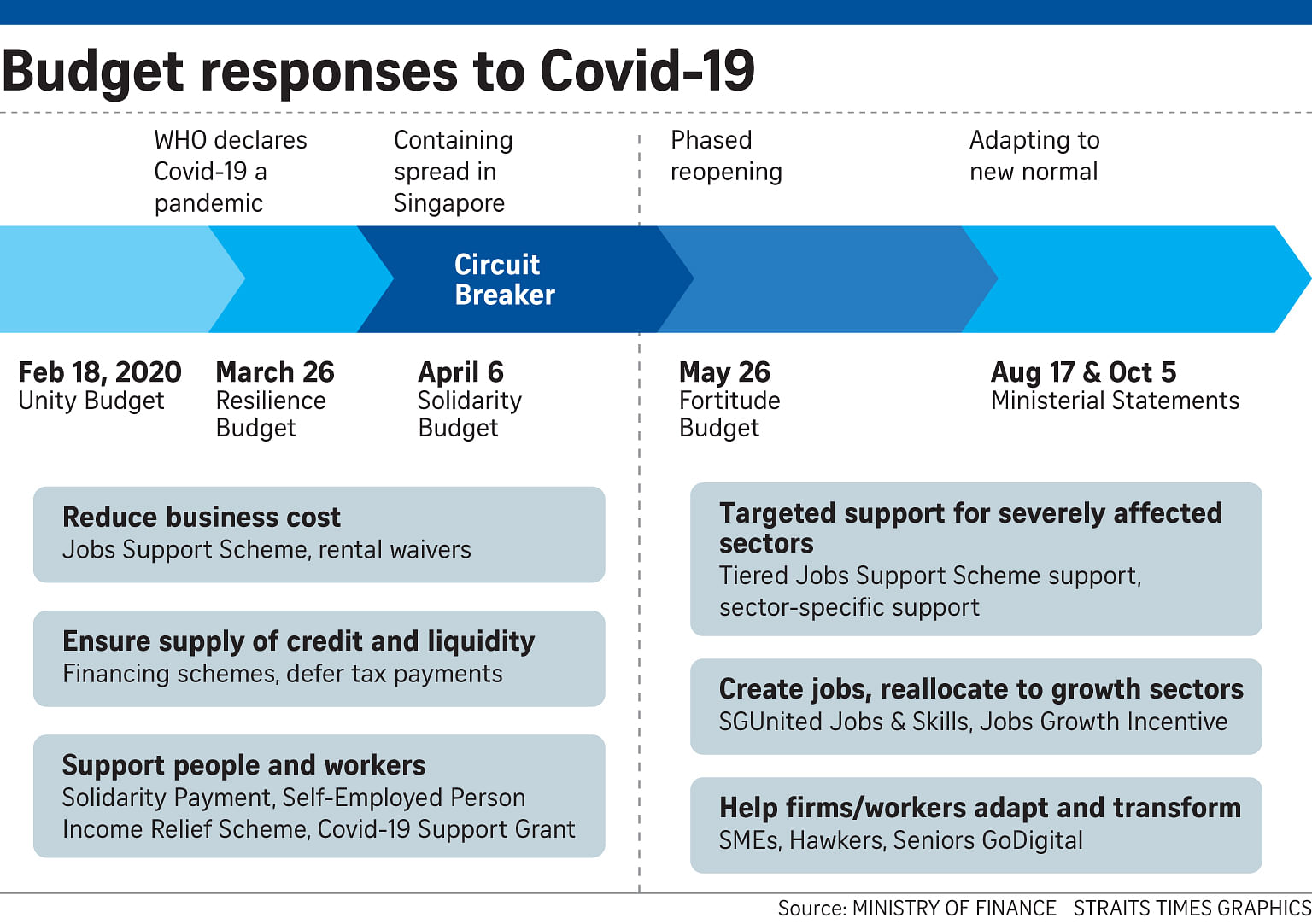Singapore averted deeper economic recession with fine-tuned measures
Quick response prevented jobless rate from spiking by a further 1.7 percentage points
Sign up now: Get ST's newsletters delivered to your inbox

Deputy Prime Minister and Finance Minister Heng Swee Keat (second from left) meeting executive sous chef Pradeep Kumar and other staff at Shangri-La's Rasa Sentosa Resort & Spa to find out how the various Budget measures have helped them. With him are (from left) Shangri-La Group regional CEO Chan Kong Leong, NTUC president Mary Liew and NTUC secretary-general Ng Chee Meng. PHOTO: MCI
As governments around the world moved to contain the coronavirus by imposing lockdowns and shutting businesses, the Ministry of Finance (MOF) had to quickly adjust last year's five Budgets.
By adapting to the crisis, Singapore averted a deeper economic recession and prevented its unemployment rate from spiking by a further 1.7 percentage points.
In its interim assessment of the impact of key Covid-19 budget measures released yesterday, the ministry said the pandemic demanded a coordinated response across the public health, economic and social domains.
The Government, in turn, responded with a strategy to protect lives, livelihoods and provide social support, MOF said. "The mix of measures was continually fine-tuned to help Singapore adapt to the rapidly changing situation."
To protect lives, $13.8 billion was committed to public health measures such as expanding contact tracing and testing capacities, beefing up the number of intensive care unit beds and community care facilities, and signing advance purchase deals with vaccine manufacturers.
The $73.5 billion devoted to workers and businesses evolved from broad-based emergency relief in order to save jobs and preserve capabilities, to facilitating resource reallocation and business transformation.
At the height of the crisis, up to 75 per cent of the wages of all resident workers were subsidised through the $26.9 billion Jobs Support Scheme (JSS).
Tax and rental relief, as well as financing schemes such as the Temporary Bridging Loan Programme, threw a lifeline to struggling firms.
As the circuit breaker and safe distancing measures limited people's opportunities to spend, government measures were more heavily weighted towards preserving capabilities, which in turn saved jobs and livelihoods, said the report.
"These measures were pivotal in preserving and creating good jobs as Singapore braved Covid-19. They also enable businesses to retain business know-how, connections and networks, allowing them to quickly bounce back as the economy recovers."
The later Budgets focused on incentivising firms to adopt technology and increase hiring, and getting people into jobs through schemes such as the SGUnited Jobs and Skills Package.

As for the $10 billion set aside for social and household support, this included schemes such as the Temporary Relief Fund, Covid-19 Support Grant and Self-Employed Persons Income Relief Scheme, which have together helped more than 500,000 people.
The combined Budgets averted a deeper economic recession last year, said MOF.
Analysis by the Monetary Authority of Singapore showed that fiscal measures shored up gross domestic product (GDP) growth by 5.5 percentage points.
Had there been no support on both the fiscal and monetary fronts, GDP would have contracted by at least 12.4 per cent instead of 5.8 per cent for the whole of last year.
The full impact on the economy is likely to be larger, as this number does not take into account measures such as relief from credit, rent and contractual obligations for firms and individuals, MOF added. "These almost certainly had a positive, although difficult to quantify, impact on economic activity and shoring up confidence."
Fiscal support may also have prevented the resident unemployment rate - 4.1 per cent last year - from rising by a further 1.7 percentage points.
Much of this can be attributed to jobs-related measures, with the JSS alone contributing 0.9 of a percentage point.


